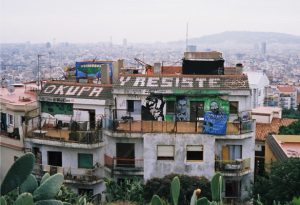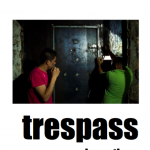 It’s an unusually warm Saturday in Berlin—if it even makes sense to refer to the weather as “unusual” anymore. I wake up early, read a bit, write some emails, change some diapers, and then head out to meet some friends at the café before the big demo. The Mietwahnsinn or “rent insanity” protest is an annual gathering of tens of thousands of people at Alexanderplatz who come together to loudly and colorfully decry the seemingly unstoppable rise of rents in the German capital. Like most big protests here, it feels like a party. Strolling down Karl-Marx-Allee, a massive boulevard built in Stalinist style for East Berlin, 40,000 human beings throb to the bass—young, old, parents, roommates, co-workers, students, tenants, and activists all drifting together in common disarray, like a roving concert, shouting about rent-sharks, high costs of living, and, most of all, expropriation. The word is on everyone’s lips, not least the city senate, the big property owners and real estate companies, the struggling tenants and just about anyone else who’s read the paper, watched the news, or walked the streets where posters, banners and graffiti calling for the expropriation of Deutsche Wohnen & Co are ubiquitous. In most cities, such radical slogans would be ignored or dismissed as the infantile fantasies of an ultra-left fringe. But not here. The demand to expropriate the largest profit-oriented property owners in Berlin—in other words, to socialize over 200,000 private apartments—is a serious proposal, one that may, in fact, take place. How did this happen? [Read More]
It’s an unusually warm Saturday in Berlin—if it even makes sense to refer to the weather as “unusual” anymore. I wake up early, read a bit, write some emails, change some diapers, and then head out to meet some friends at the café before the big demo. The Mietwahnsinn or “rent insanity” protest is an annual gathering of tens of thousands of people at Alexanderplatz who come together to loudly and colorfully decry the seemingly unstoppable rise of rents in the German capital. Like most big protests here, it feels like a party. Strolling down Karl-Marx-Allee, a massive boulevard built in Stalinist style for East Berlin, 40,000 human beings throb to the bass—young, old, parents, roommates, co-workers, students, tenants, and activists all drifting together in common disarray, like a roving concert, shouting about rent-sharks, high costs of living, and, most of all, expropriation. The word is on everyone’s lips, not least the city senate, the big property owners and real estate companies, the struggling tenants and just about anyone else who’s read the paper, watched the news, or walked the streets where posters, banners and graffiti calling for the expropriation of Deutsche Wohnen & Co are ubiquitous. In most cities, such radical slogans would be ignored or dismissed as the infantile fantasies of an ultra-left fringe. But not here. The demand to expropriate the largest profit-oriented property owners in Berlin—in other words, to socialize over 200,000 private apartments—is a serious proposal, one that may, in fact, take place. How did this happen? [Read More]










